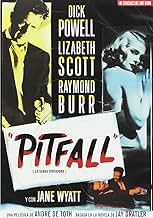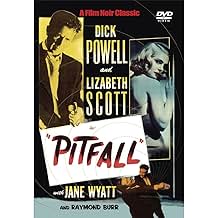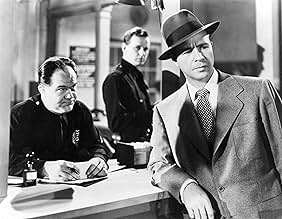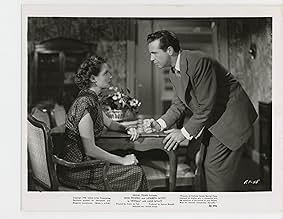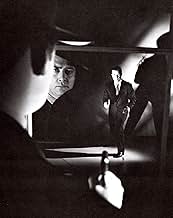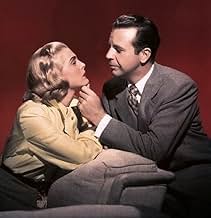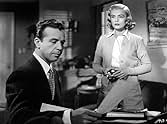VALUTAZIONE IMDb
7,1/10
4972
LA TUA VALUTAZIONE
Aggiungi una trama nella tua linguaMarried insurance adjuster John Forbes falls for femme fatale Mona Stevens while her boyfriend is in jail and all suffer serious consequences as a result.Married insurance adjuster John Forbes falls for femme fatale Mona Stevens while her boyfriend is in jail and all suffer serious consequences as a result.Married insurance adjuster John Forbes falls for femme fatale Mona Stevens while her boyfriend is in jail and all suffer serious consequences as a result.
- Regia
- Sceneggiatura
- Star
- Premi
- 1 vittoria in totale
Dick Wessel
- Desk Sergeant
- (as Dick Wassel)
Eddie Borden
- Prison Visitor
- (non citato nei titoli originali)
Helen Dickson
- Fashion Show Attendee
- (non citato nei titoli originali)
Don Haggerty
- District Attorney's Man
- (non citato nei titoli originali)
Sam Harris
- Man in Diner
- (non citato nei titoli originali)
Thomas Martin
- Bartender
- (non citato nei titoli originali)
David McMahon
- Police Lieutenant
- (non citato nei titoli originali)
Recensioni in evidenza
Pitfall is about precisely that. Forty something insurance man Dick Powell is getting restless. He's seemingly achieved the American dream, wife, kid, nice home and car. And the nice wife is played by Jane Wyatt who was using this film to warm up for the queen of nice wives in the Fifties as Betty Anderson in Father Knows Best.
Powell is brought a report on a claim that one of the hired investigators Raymond Burr has. Byron Barr has embezzled money that Powell's insurance company is covering. Barr has spent the money lavishly on presents for Lizabeth Scott. Powell has to check this one out for himself. Of course he meets Lizabeth Scott and nature takes its course. Barr mean time is serving time in jail and Raymond Burr has decided to stake out Ms. Scott for himself. Or maybe the right word is stalk.
So we've got Barr serving, Burr stalking, Powell cheating, what's this Lizabeth Scott got to get all these guys hormones working in overdrive?
My description of Pitfall may have been flip up to now, but it really is a fine drama with no real heroes in it, except maybe Jane Wyatt. The best performance in Pitfall goes to Raymond Burr who is really a malevolent figure with his obsession about Scott.
Powell is brought a report on a claim that one of the hired investigators Raymond Burr has. Byron Barr has embezzled money that Powell's insurance company is covering. Barr has spent the money lavishly on presents for Lizabeth Scott. Powell has to check this one out for himself. Of course he meets Lizabeth Scott and nature takes its course. Barr mean time is serving time in jail and Raymond Burr has decided to stake out Ms. Scott for himself. Or maybe the right word is stalk.
So we've got Barr serving, Burr stalking, Powell cheating, what's this Lizabeth Scott got to get all these guys hormones working in overdrive?
My description of Pitfall may have been flip up to now, but it really is a fine drama with no real heroes in it, except maybe Jane Wyatt. The best performance in Pitfall goes to Raymond Burr who is really a malevolent figure with his obsession about Scott.
PITFALL (United Artists, 1948), a Regal Film Production directed by Andre De Toth, is a well constructed melodrama starring Dick Powell in one of his best screen performances as Johnny Forbes, a claims adjuster for Olympic Mutual Insurance Company living in a nice home in the suburb of the Los Angeles area with a wife, Sue (Jane Wyatt) and young son, Tommy (Jimmy Hunt). Everything seems fine as the family is introduced getting ready for another day at the breakfast table, but there's only one problem, though. Johnny is bored, bored with routine, bored with life, bored with everything. Neither does he know that his new day at the office would start of a chain of events that's to change his routine of life forever. As his firm is to pay off on the $10,000 robbery committed by Bill Smiley (Byron Barr), now serving time in prison, with items of stolen goods given to his girlfriend, Mona Stevens (Lizabeth Scott), a fashion model, Johnny's next assignment is to recover some of the items by meeting with Miss Stevens himself after company detective J.B. "Mac" MacDonald (Raymond Burr) has located the girl in question. An innocent meeting between Johnny and Mona soon turns to an illicit affair with Mac menacing Johnny for stepping into his territory in wanting the girl all for himself, regardless of her rejection towards him, leading to a pitfall of lies, cover-ups, deceit and murder.
Powell, who began his screen career in movie musicals at Warner Brothers in the 1930s, established himself a decade later as a fine dramatic actor starting with MURDER, MY SWEET (RKO Radio, 1944) in which he played private eye, Philip Marlowe. Other dramatic roles followed, including CORNERED (RKO, 1945) and JOHNNY O'CLOCK (Columbia, 1947), that formulated Powell as a 1940s tough guy, but it is PITFALL that is equally as good as his previous dramatic efforts combined. Powell's Johnny Forbes is someone who can very well be any average man, bored with life and unsure of himself. A well-scripted drama based on "The Pitfall" by Jay Dratner, with able support by Jane Wyatt as his caring but somewhat suspicious wife; Lizabeth Scott as a tough girl with the raspy voice whose life meets with further obstacles when unwittingly falling in love with a married man, but it's Raymond Burr's role that goes without question, predating Robert Mitchum's performance in CAPE FEAR (1962), as a creepy stalker who won't take no for an answer when it comes to getting someone he wants. His crucial moments include beating up Forbes in front of his home as he warns him to stay away from Mona; his constant stalking of Mona at both job and home; and even going to her boyfriend in prison with intentions of getting him jealous with envy over Mona. Also in the cast are Ann Doran as Powell's secretary; Selmer Jackson as Ed Brawley; and former Warner Brothers contract player John Litel in one scene as a district attorney with advise to Powell's character what he should have done to avoid his pitfall of murder. Had he done that, there would have been no movie, no story, no PITFALL.
What originally attracted me to watching PITFALL when televised in the late 60s/ early 70s on the afternoon movie was actually getting to see Raymond Burr, whose prime time IRONSIDE TV show along with reruns of his popular TV series "Perry Mason" has made him into a public figure among TV personalities at that time. As much as Burr nearly acquires more attention than his leading players, I was equally impressed by its leads, Powell and Scott. I was even more surprised later on when I came across an early musical, 42nd STREET (1933) to find this to be the same Dick Powell from PITFALL as the baby faced singer introducing the hit tune, "Young and Healthy." There's no singing this time around, not even that of Raymond Burr crooning, "I've Got You All to Myself" to Lizabeth Scott listening to him attendedly with disgust. Overall, PITFALL is straight drama that doesn't let up for an instant. Aside from Powell's low-key character, there's Jane Wyatt, whom I've grown to know from her 1950s TV series, FATHER KNOWS BEST starring Robert Young, as a wife and mother, who, unlike housewives of the day, is a little ahead of her time as the one who drives her husband to work. Her emotions, especially its conclusion, are well handled and realistically done for its time.
Of the handful of classic "film noirs" that turned out in the 1940s, PITFALL is one that's virtually unknown to many due to lack of television broadcasts. Had it starred stronger names as Humphrey Bogart and Lauren Bacall, or Alan Ladd and Veronica Lake for that matter, in the Powell-Scott roles, chances are PITFALL would be a well known classic from the 1940s, but as it turns out, entire production, including actual location footage of Los Angeles, makes this worth viewing. Rarely televised since the 1970s, PITFALL did see the light when distributed on VHS through Republic Home Video in 1991, and many years later on Turner Classic Movies, September 2, 2013. (***1/2)
Powell, who began his screen career in movie musicals at Warner Brothers in the 1930s, established himself a decade later as a fine dramatic actor starting with MURDER, MY SWEET (RKO Radio, 1944) in which he played private eye, Philip Marlowe. Other dramatic roles followed, including CORNERED (RKO, 1945) and JOHNNY O'CLOCK (Columbia, 1947), that formulated Powell as a 1940s tough guy, but it is PITFALL that is equally as good as his previous dramatic efforts combined. Powell's Johnny Forbes is someone who can very well be any average man, bored with life and unsure of himself. A well-scripted drama based on "The Pitfall" by Jay Dratner, with able support by Jane Wyatt as his caring but somewhat suspicious wife; Lizabeth Scott as a tough girl with the raspy voice whose life meets with further obstacles when unwittingly falling in love with a married man, but it's Raymond Burr's role that goes without question, predating Robert Mitchum's performance in CAPE FEAR (1962), as a creepy stalker who won't take no for an answer when it comes to getting someone he wants. His crucial moments include beating up Forbes in front of his home as he warns him to stay away from Mona; his constant stalking of Mona at both job and home; and even going to her boyfriend in prison with intentions of getting him jealous with envy over Mona. Also in the cast are Ann Doran as Powell's secretary; Selmer Jackson as Ed Brawley; and former Warner Brothers contract player John Litel in one scene as a district attorney with advise to Powell's character what he should have done to avoid his pitfall of murder. Had he done that, there would have been no movie, no story, no PITFALL.
What originally attracted me to watching PITFALL when televised in the late 60s/ early 70s on the afternoon movie was actually getting to see Raymond Burr, whose prime time IRONSIDE TV show along with reruns of his popular TV series "Perry Mason" has made him into a public figure among TV personalities at that time. As much as Burr nearly acquires more attention than his leading players, I was equally impressed by its leads, Powell and Scott. I was even more surprised later on when I came across an early musical, 42nd STREET (1933) to find this to be the same Dick Powell from PITFALL as the baby faced singer introducing the hit tune, "Young and Healthy." There's no singing this time around, not even that of Raymond Burr crooning, "I've Got You All to Myself" to Lizabeth Scott listening to him attendedly with disgust. Overall, PITFALL is straight drama that doesn't let up for an instant. Aside from Powell's low-key character, there's Jane Wyatt, whom I've grown to know from her 1950s TV series, FATHER KNOWS BEST starring Robert Young, as a wife and mother, who, unlike housewives of the day, is a little ahead of her time as the one who drives her husband to work. Her emotions, especially its conclusion, are well handled and realistically done for its time.
Of the handful of classic "film noirs" that turned out in the 1940s, PITFALL is one that's virtually unknown to many due to lack of television broadcasts. Had it starred stronger names as Humphrey Bogart and Lauren Bacall, or Alan Ladd and Veronica Lake for that matter, in the Powell-Scott roles, chances are PITFALL would be a well known classic from the 1940s, but as it turns out, entire production, including actual location footage of Los Angeles, makes this worth viewing. Rarely televised since the 1970s, PITFALL did see the light when distributed on VHS through Republic Home Video in 1991, and many years later on Turner Classic Movies, September 2, 2013. (***1/2)
It's still funny to think that Powell was originally a song and dance man. He does the hard boiled noir character fairly well. Straight laced, stiff but a sucker for a femme fatale. Burr is sufficiently creepy - not perhaps to the extreme of Anthony Hopkins as Hannibal but sufficient nonetheless. It's often interesting to see what kind of careers many actors played before they became famous or landed their most well known roles. This is one of those roles for him. I don't find Lizabeth Scott very believable as a model. She has a funny speech pattern and looks like a heavy smoker. Of course, smoking was considered glamorous in those days. Don't get me wrong, I enjoy her acting in the right roles. But a seductress she is not.
The story works as a basic noir plot. When I read that Jay Dratler was the author I understood why I liked it. He is the author of the original story of Call Northside 777 and Laura which are both well written.
It feels Jane Wyatt is still trying to play Margaret Anderson. Maybe that's what the director wanted but her acting seems out of place. She does well as the faithful, sweet wife. But it just doesn't fit.
Unfortunately the film quality of the version I watched was not too good. It was either washed out or overexposed. That\s not the fault of the film makers but it did effect my further enjoyment of the film. It would be worth restoring.
All film reviews are opinions and you know what they say about opinions...
Overall I liked the film and I'm glad I discovered it. Thank you again TCM!
The story works as a basic noir plot. When I read that Jay Dratler was the author I understood why I liked it. He is the author of the original story of Call Northside 777 and Laura which are both well written.
It feels Jane Wyatt is still trying to play Margaret Anderson. Maybe that's what the director wanted but her acting seems out of place. She does well as the faithful, sweet wife. But it just doesn't fit.
Unfortunately the film quality of the version I watched was not too good. It was either washed out or overexposed. That\s not the fault of the film makers but it did effect my further enjoyment of the film. It would be worth restoring.
All film reviews are opinions and you know what they say about opinions...
Overall I liked the film and I'm glad I discovered it. Thank you again TCM!
Andre De Toth's Pitfall opens in the shaky sanctuary of post-war domestic bliss. Jane Wyatt cracks eggs into a cast-iron skillet, to be served to her insurance-claims adjuster husband Dick Powell and their tousle-haired young son; the cozy breakfast nook where they exchange morning what-if banter looks out upon a vista of the New California of subdivisions and revolving credit and sunny possibilities yet to be realized. But, as Wyatt drives Powell into downtown Los Angeles (two-car families still being around the corner), he grouses absently about his routine job and clockwork schedule before giving her a perfunctory peck on the cheek. The canker has invaded the rose. As he later confesses, he feels he's in a rut `six feet deep,' and yearns for freedom adventure. He gets more than he bargained for.
Waiting for him in his office is `Gruesome,' private investigator Raymond Burr, who's done some legwork concerning a convicted felon who has defrauded the company. The felon (Byron Barr) squandered most of his ill-gained money showering his girlfriend (Lizabeth Scott) with furs, an engagement ring and even a little speedboat. Burr, in the course of his sleazy sleuthing, has taken quite an obsessive fancy to her, but Powell warns him off, saying he'll wrap the case up himself.
At first Scott dismisses Powell as just `a little man with a briefcase,' an assessment that tallies too well with his own worst self-image. But to no one's surprise, in this climate of Pacific air and marital dissatisfaction, he ends up taking his own fancy to her, one that turns out to be mutual. They tear around the harbor in her boat, then fritter away the rest of the afternoon in a dim cocktail lounge. He doesn't get back to hearth and home till the wee small hours.
One night when his son is awakened by nightmares, Powell lectures him: `Take only good pictures and have only good dreams.' It's a case of do what I say, not what I do. By veering off from the straight and narrow, Powell has set into motion a chain of baleful events. The vindictive Burr assaults him outside his garage. Scott discovers that Powell's been hiding his life as a married father. Ex-cop Burr starts visiting Barr in stir, sowing seeds of jealousy and plans for revenge. Events converge one dreadful night with an unplanned pair of killings that leave the quick, arguably, worse off than the dead....
Jay Dratler's script (from his own novel) shows a progressive streak in dealing with the short and unpredictable fuses of controlling, potentially violent males stalkers. The script also serves the assembled cast well. True, there's not much to be done with Wyatt, with her cap-sleeved house-dresses and finishing-school elocution, but she's more plausible than she would be two years later as a highly unlikely femme fatale in The Man Who Cheated Himself. Here, she's the distaff side of those male dictators, a wife whose ideals of suburban decorum are chiseled into cold marble (she's a faint forerunner of Joan Crawford's Harriet Craig).
But Powell gets to tap deeply into his key emotion, snappish discontent, and lets it deepen into something close to small-time tragedy. Scott, always an iconic presence but an actress with limits, finds a comfortable part as a bewildered and vulnerable victim of the men who come into her life, bidden and unbidden. Burr, billed fourth (after Wyatt!), possibly fares best. Much in demand in the late 40s as one of the creepiest heavies, he earned that demand by providing extra (and maybe unasked-for) dimensions to the thugs he played. Like the giant Fafner in Das Rheingold, he lets a bit of yearning, of desperation, show under all his intimidating bulk (and in sheer avoirdupois, it's one of his biggest roles).
De Toth, better remembered for his westerns and 3-D horror pix like House of Wax, made, in Pitfall, one of the more distinctive titles of the noir cycle. Not often mentioned in top-ten lists, even those of black-and-white crime films of the post-war era, it has the effrontery to situate deceit and duplicity and betrayal where it surely ought not to belong not in road houses or tenement flats but right at the heart of a storybook American family (it's one of the more subversive films of the era).. Yes, there are lapses, chief among which is a score that keeps trying to crack corny little jokes. But in the denouement far from unleashing a hideous storm of terror, De Toth opts for cold detachment he casts a chill that lingers still.
Waiting for him in his office is `Gruesome,' private investigator Raymond Burr, who's done some legwork concerning a convicted felon who has defrauded the company. The felon (Byron Barr) squandered most of his ill-gained money showering his girlfriend (Lizabeth Scott) with furs, an engagement ring and even a little speedboat. Burr, in the course of his sleazy sleuthing, has taken quite an obsessive fancy to her, but Powell warns him off, saying he'll wrap the case up himself.
At first Scott dismisses Powell as just `a little man with a briefcase,' an assessment that tallies too well with his own worst self-image. But to no one's surprise, in this climate of Pacific air and marital dissatisfaction, he ends up taking his own fancy to her, one that turns out to be mutual. They tear around the harbor in her boat, then fritter away the rest of the afternoon in a dim cocktail lounge. He doesn't get back to hearth and home till the wee small hours.
One night when his son is awakened by nightmares, Powell lectures him: `Take only good pictures and have only good dreams.' It's a case of do what I say, not what I do. By veering off from the straight and narrow, Powell has set into motion a chain of baleful events. The vindictive Burr assaults him outside his garage. Scott discovers that Powell's been hiding his life as a married father. Ex-cop Burr starts visiting Barr in stir, sowing seeds of jealousy and plans for revenge. Events converge one dreadful night with an unplanned pair of killings that leave the quick, arguably, worse off than the dead....
Jay Dratler's script (from his own novel) shows a progressive streak in dealing with the short and unpredictable fuses of controlling, potentially violent males stalkers. The script also serves the assembled cast well. True, there's not much to be done with Wyatt, with her cap-sleeved house-dresses and finishing-school elocution, but she's more plausible than she would be two years later as a highly unlikely femme fatale in The Man Who Cheated Himself. Here, she's the distaff side of those male dictators, a wife whose ideals of suburban decorum are chiseled into cold marble (she's a faint forerunner of Joan Crawford's Harriet Craig).
But Powell gets to tap deeply into his key emotion, snappish discontent, and lets it deepen into something close to small-time tragedy. Scott, always an iconic presence but an actress with limits, finds a comfortable part as a bewildered and vulnerable victim of the men who come into her life, bidden and unbidden. Burr, billed fourth (after Wyatt!), possibly fares best. Much in demand in the late 40s as one of the creepiest heavies, he earned that demand by providing extra (and maybe unasked-for) dimensions to the thugs he played. Like the giant Fafner in Das Rheingold, he lets a bit of yearning, of desperation, show under all his intimidating bulk (and in sheer avoirdupois, it's one of his biggest roles).
De Toth, better remembered for his westerns and 3-D horror pix like House of Wax, made, in Pitfall, one of the more distinctive titles of the noir cycle. Not often mentioned in top-ten lists, even those of black-and-white crime films of the post-war era, it has the effrontery to situate deceit and duplicity and betrayal where it surely ought not to belong not in road houses or tenement flats but right at the heart of a storybook American family (it's one of the more subversive films of the era).. Yes, there are lapses, chief among which is a score that keeps trying to crack corny little jokes. But in the denouement far from unleashing a hideous storm of terror, De Toth opts for cold detachment he casts a chill that lingers still.
This is an all-around great noir film, as well as a very chilling anticipation of the sterlingness of the coming 50's ethos of home and fidelity at any price. Dick Powell gives a great performance as a man so tired of life and full of malaise that he can hardly stumble through his days as an insurance adjuster and "loving" father . Raymond Burr is the antithesis of his later Perry Mason (or the good-hearted Paul Drake) as a creepy detective stalking the low-rent Lizabeth Scott. And Jane Wyatt is (unintentionally?) the scariest of them all as Powells' homemaking wife. (After her son has a nightmare, she blames his comic books - and takes them away to be burned!) Pitfall is a fine example of the type of noir film that explores not the criminal underworld but the hidden pain and loneliness of the "everyman".
Lo sapevi?
- QuizThis was independently produced by Regal Films and released through United Artists. For decades, the film was rarely seen. It can be seen today through the preservation efforts of the UCLA Film and Television Archives.
- BlooperThe public elevator indicator in the Los Angeles Hall of Justice building shows floors 1 to 19. However, in reality, the building is only 14 stories tall.
- Citazioni
Tommy Forbes: Dad was a boxer in college!
Doctor: I think he was wise to go into insurance.
Doctor: [handing a prescription to Sue Forbes] Take this up to the drug store.
Sue Forbes: What is it?
Doctor: A course in boxing.
- ConnessioniFeatured in Noir Alley: Pitfall (2018)
I più visti
Accedi per valutare e creare un elenco di titoli salvati per ottenere consigli personalizzati
Dettagli
- Data di uscita
- Paese di origine
- Lingue
- Celebre anche come
- La senda tentadora
- Luoghi delle riprese
- 5424 Bradna Drive, Los Angeles, California, Stati Uniti(Forbes Family Home)
- Azienda produttrice
- Vedi altri crediti dell’azienda su IMDbPro
Botteghino
- Budget
- 1.000.000 USD (previsto)
- Tempo di esecuzione1 ora 26 minuti
- Colore
- Proporzioni
- 1.37 : 1
Contribuisci a questa pagina
Suggerisci una modifica o aggiungi i contenuti mancanti

Divario superiore
By what name was Tragedia a Santa Monica (1948) officially released in India in English?
Rispondi

